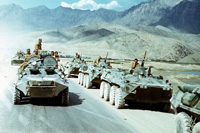USA lured USSR into the trap of Afghanistan war
Russia marked the 20th anniversary of the withdrawal of the last Soviet troops from Afghanistan on February 15. The Soviet Union lost over 14,000 people during ten years of the war – from 1979 to 1989. Over a thousand military men became disabled individuals as a result of the war. The soldiers of the Soviet Army were absolutely unaware of the big political game around Afghanistan.

Experts still differ in their estimations of those events. Some of them say that the USSR was forced to deploy its troops in Afghanistan because the country, which borders on three post-Soviet republics, would have been used against the Soviet Union otherwise. The leaders of the People’s Democratic Party of Afghanistan, which came to power in the country in April 1978, were USSR-loyal politicians, although their positions in the country could not be described as absolutely reliable.
Islamic fundamentalists began to show armed resistance to the party since the summer of 1978 with the help from the United States, Great Britain, several Muslim states and China. “It was July 3, 1979 that President Carter signed the first directive for secret aid to the opponents of the pro-Soviet regime in Kabul. And that very day, I wrote a note to the president in which I explained to him that in my opinion this aid was going to induce a Soviet military intervention,” Zbigniew Brzezinski said an in interview with Le Nouvel Observateur (France).
Mujahideens were gradually conquering new areas of the country threatening to topple the USSR-loyal government. It was one of the factors, which made the USSR deploy the troops in Afghanistan.
The adversaries of the Soviet-led intervention say that the attempt to win the guerilla warfare in Afghanistan was doomed from the very beginning. For example, Soviet troops conducted several large-scale operations in the Panjsheri Gorge during ten years of the Afghan war to eliminate field commander Ahmad Shah Massoud. Many lives were taken during those battles, but the gorge was never taken under control.
“That secret operation was an excellent idea. It had the effect of drawing the Russians into the Afghan trap and you want me to regret it? The day that the Soviets officially crossed the border, I wrote to President Carter: We now have the opportunity of giving to the USSR its Vietnam war. Indeed, for almost 10 years, Moscow had to carry on a war unsupportable by the government, a conflict that brought about the demoralization and finally the breakup of the Soviet empire,” Brzezinski said in the above-mentioned interview.
Modern-day experts say that the Soviet administration was lured into the trap of the guerrilla warfare.
The soldiers of the Soviet Army, who served in Afghanistan, did their duty honestly and nobly. The army can not be responsible for political mistakes. It is worthy of note that the production of drugs in Afghanistan was minimized during the Soviet military presence in the country. As soon as the NATO contingent was deployed there, Afghanistan turned into the world’s largest maker of heroine and opium.
The Taliban movement came into power in Afghanistan in 1996. The country became the second home for Islamists from all over the world. On the other hand, Talibs began to struggle with the drug mafia. They instituted death penalty for drug dealers.
NATO troops invaded Afghanistan in 2001, overturned the Talibs and brought their mentor, Hamid Karzai, to power. NATO’s incursion marked the end of the struggle against the drug mafia. The harvests of opium poppy increased 44 times during seven years and made up 8,200 tons of opium (1.171,5 tons of heroine), UN experts said. Afghanistan is currently the world’s largest maker of all opium drugs.
The leading countries of the world continue to play their Afghan card nowadays. War and struggle will continue to eat Afghanistan from inside for years against such a background.
Vladimir Anokhin
Vadim Trukhachev
Subscribe to Pravda.Ru Telegram channel, Facebook, RSS!




